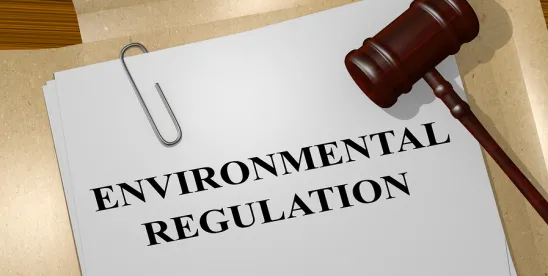The U.S. Court of Appeals for the Fourth Circuit recently overturned a lower court’s order for the Environmental Protection Agency (EPA) to conduct a study of air pollution rules’ impact on jobs, and it has broad ramifications across industries.
The Fourth Circuit’s ruling in Murray Energy Corp. v. Adm’r EPA may impact the scope of citizen suits under the Clean Air Act (CAA) and other statutes, including environmental activism cases with the potential to expose companies to significant liabilities. In addition, the EPA’s future rulemaking is likely to continue to have significant implications for industry jobs.
Narrowing the scope of environmental citizen suits: The court limited a person’s rights under the CAA to challenge EPA action or inaction by clarifying that a person may not challenge all agency activities and responsibilities. As a result, industry and environmental groups have fewer options to challenge agency actions.
Future rulemaking implications on industry jobs: We expect that EPA will continue to only indirectly consider the impact that its CAA rules have on industry jobs. Accordingly, EPA may pass rules down the road with a potentially profound impact on the job market of affected industries without conducting a focused evaluation of jobs impact.
The CAA and Lower Court Ruling
Section 321(a) of the CAA directs EPA to evaluate the potential employment impact of CAA administration and enforcement:
The [EPA] Administrator shall conduct continuing evaluations of potential loss or shifts of employment which may result from the administration or enforcement of the provision of this chapter and applicable implementation plans, including where appropriate, investigating threatened plant closures or reductions in employment allegedly resulting from such administration or enforcement.
Under the CAA, citizens may sue the EPA administrator “where there is alleged a failure of the Administrator to perform any act or duty under [the CAA] which is not discretionary with the Administrator.”
In 2014, Murray Energy Corporation and related companies sued the EPA administrator under the citizen suit provision and alleged that EPA failed to perform the Jobs Review Mandate relative to the impact of CAA regulations on jobs in the coal industry. The district court agreed and held that EPA had not satisfied the Jobs Review Mandate, noting that it required the agency to assess the actual, site-specific effect of CAA implementation on jobs. The court ordered EPA to file a plan, and schedule for compliance with the Jobs Review Mandate. It also ordered EPA to broadly evaluate (1) facilities at risk of closure or “reductions in employment because of EPA’s CAA rules related to coal; (2) past effects on employment; and (3) impact of CAA-related employment on families and communities. EPA appealed.
Fourth Circuit Ruling
On appeal, the Fourth Circuit held that district courts lacked jurisdiction to hear citizen suits to enforce the Jobs Review Mandate. This decision narrowly interprets the CAA’s citizen suit provision and broadly construes the Jobs Review Mandate. The decision specifically notes that courts have narrowly construed the CAA Section 304(a)(2) to enforcement of “legally required acts or duties of a specific and discrete nature that precludes broad agency discretion.” That interpretation cabins the opportunity for courts to evaluate complex administrative processes, which otherwise could be left to agency discretion.
The Fourth Circuit then held that the Jobs Review Mandate is not “of a specific and discrete nature,” but rather one that is “broad” and “open-ended”. The court noted, for example, that the Jobs Review Mandate does not specify “guidelines and procedures relevant to [these] evaluations,” unlike other CAA provisions. It also mentioned that the Jobs Review Mandate requires EPA to evaluate changes in employment on a continuing and ever changing basis. After ruling on jurisdictional grounds, the Fourth Circuit declined to address EPA’s challenges to the district court’s standing, merits, and remedial rulings.




 />i
/>i

